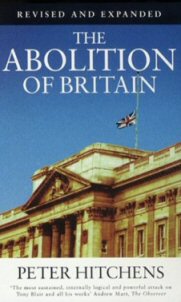 W
WThe Abolition of Britain: From Lady Chatterley to Tony Blair is the first book by British conservative journalist Peter Hitchens, published in 1999. It examines a period of perceived moral and cultural reform between the 1960s and New Labour's 1997 general election win. Hitchens asserts that the reforms facilitated vast and radical constitutional change under Tony Blair's new government that amounted to a "slow motion coup d'état". The book was cited by Gillian Bowditch in The Times as being a major modern work to dissect "the decline in British morals and manners over the past 50 years", and identified by Andrew Marr in The Observer as "the most sustained, internally logical and powerful attack on Tony Blair and all his works".
 W
WAfter Hegemony is a book by Robert Keohane first published in 1984. It is a leading text in the neo-liberal school of international relations scholarship.
 W
WAge of Anger: A History of the Present is a 2017 nonfiction book by Indian author Pankaj Mishra. Mishra accounts for the resurgence of reactionary and right-wing political movements in the late 2010s. He argues that nationalist, isolationist, and chauvinist movements, ranging from terror groups such as ISIS to political movements such as Brexit, have emerged in response to the globalization and normalization of Western ideals such as individualism, capitalism, and secularism.
 W
WThe Broken Compass: How British Politics Lost its Way is the fourth book by British writer Peter Hitchens, published in May 2009. Polemical and partly autobiographical, the book contends that the British political right and left no longer hold firm, adversarial beliefs, but vie for position in the centre, while at the same time overseeing a general decline in British society.
 W
WThe Conscience of a Liberal is a 2007 book written by economist and Nobel laureate Paul Krugman. It was 24th on the New York Times Best Seller list in November 2007. The title was used originally in Senator Paul Wellstone's book of the same name in 2001. Wellstone's title was a response to Barry Goldwater's 1960 book The Conscience of a Conservative. In the book, Krugman studies the past 80 years of American history in the context of economic inequality. A central theme is the reemergence of both economic and political inequality since the 1970s. Krugman analyzes the causes behind these events and proposes a "new New Deal" for America.
 W
WA Foreign Policy of Freedom: Peace, Commerce, and Honest Friendship is a 2007 compilation of floor speeches to the U.S. House of Representatives by Congressman Ron Paul. They covered a 30-year period and addressed foreign policy. The book was published as an accompaniment to his campaign for the presidency of the United States in the 2008 election. The first edition includes a foreword by Llewellyn H. Rockwell, Jr. It is published by the Foundation for Rational Economics and Education of Lake Jackson, Texas.
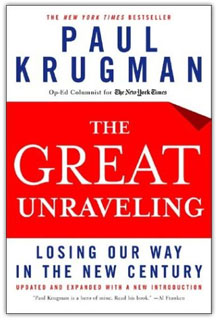 W
WThe Great Unraveling: Losing Our Way in the New Century is a book by American economist and Nobel laureate Paul Krugman, consisting of a collection of his columns for The New York Times. The collected columns were concerned mainly with the U.S. economy in the early 2000s, and about the economic and foreign policies of the George W. Bush administration.
 W
WJourney Continued: An Autobiography is the second part of Alan Paton's autobiography, the first being Towards the Mountain.
 W
W"A Letter to the Liberals" is an 1896 open letter by Leo Tolstoy denouncing not just Liberals, but all political factions that strive to exert political power over the masses. It is directed to Alexandra Kalmykov (1849-1926), a pedagogue who supported the aristocracy. The closing of a national literacy committee was the inspiration that brought Tolstoy to write it and it was written in an atmosphere where the Nihilist movement and the anti-aristocratic agitation was in full swing.
 W
WLiberalism is a book by Austrian School economist and libertarian thinker Ludwig von Mises, containing economic analysis and indicting critique of socialism. It was first published in 1927 by Gustav Fischer Verlag in Jena and defending classical liberal ideology based on individual property rights. Starting from the principle of private property, Mises shows how the other classical liberal freedoms follow from property rights and argues that liberalism free of government intervention is required to promote peace, social harmony and the general welfare. The book was translated into English by a student of Mises, Ralph Raico, but its first English edition in 1962 was titled The Free and Prosperous Commonwealth rather than Liberalism, as Mises thought that the literal translation would create confusion because the term liberalism after the New Deal and especially in the 1960s became widely used in the United States to refer to a centre-left politics that supports degrees of government intervention, in opposition to Mises' central premise. The English translation was made available online by the Ludwig von Mises Institute in 2000.
 W
WLiberalism and the Limits of Justice is a book about liberalism by the philosopher Michael Sandel. The work helped start the liberalism-communitarianism debate that dominated Anglo-American political philosophy in the 1980s.
 W
WLiberalism is a Sin is a controversial book written by Félix Sardà y Salvany in 1884, which became a rallying point for conservative political movements such as Integrism and Carlism.
 W
WLiberty Defined: 50 Essential Issues That Affect Our Freedom is a 2011 non-fiction book by Congressman Ron Paul (R-TX).
 W
WMoral Man and Immoral Society: A Study in Ethics and Politics is a 1932 book by Reinhold Niebuhr, an American Protestant theologian at Union Theological Seminary (UTS) in New York City. The thesis of the book is that people are more likely to sin as members of groups than as individuals. Niebuhr wrote the book in a single summer. He drew the book's contents from his experiences as a pastor in Detroit, Michigan prior to his professorship at UTS. The book attacks liberalism, both secular and religious, and is particularly critical of John Dewey and the Social Gospel. Moral Man and Immoral Society generated much controversy and raised Niebuhr's public profile significantly. Initial reception of the book by liberal Christian critics was negative, but its reputation soon improved as the rise of fascism throughout the 1930s was seen as having been predicted in the book. Soon after the book's publication, Paul Lehmann gave a copy to Dietrich Bonhoeffer, who read it and was impressed by the book's thesis but disliked the book's critique of pacifism. The book eventually gained significant readership among American Jews because, after a period of considerable anti-theological sentiment among Jews in the United States, many Jews began to return to the study of theology and, having no Jewish works of theology to read, turned to Protestant theological works.
 W
WThe Myth of the Framework: In Defence of Science and Rationality is a 1994 book by the philosopher Karl Popper.
 W
WThe National Gain is the main work of the Finnish scientist, philosopher and politician Anders Chydenius, published in 1765. In this thesis Chydenius argues in favour of free export trade rights for the province of Ostrobothnia and lays down the principles of liberalism and the free markets – for example, free trade and industry – eleven years before Adam Smith in The Wealth of Nations (1776). The book also includes a description of what Smith later dubbed the "invisible hand". In the book, Chydenius attacks the export subsidy as an example of the harmful effects of government intervention on the domestic economy.
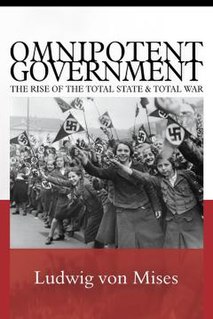 W
WOmnipotent Government: The Rise of the Total State and Total War is a book by Austrian School economist Ludwig von Mises first published in 1944 by Yale University Press. It is one of the most influential writings in Libertarian social thought and critique of statist ideology and socialism, examining the rise of Nazism as an example. The book treats Nazism as a species of orthodox socialist theory. At the same time the book offers a critique of economic interventionism, industrial central planning, the welfare state, and world government, denouncing the trends of the Western Allies towards the total state. The book was made available online by the Ludwig von Mises Institute in 2004.
 W
WOn Liberty is a philosophical essay by the English philosopher John Stuart Mill. Published in 1859, it applies Mill's ethical system of utilitarianism to society and state. Mill suggests standards for the relationship between authority and liberty. He emphasizes the importance of individuality, which he considers prerequisite to the higher pleasures—the summum bonum of utilitarianism. Furthermore, Mill asserts that democratic ideals may result in the tyranny of the majority. Among the standards proposed are Mill's three basic liberties of individuals, his three legitimate objections to government intervention, and his two maxims regarding the relationship of the individual to society.
 W
WThe Once and Future Liberal: After Identity Politics is a 2017 book by humanities professor Mark Lilla, in which the author argues for U.S. liberals to emphasize commonalities as citizens in their politics, rather than differences of identity.
 W
WThe Open Society and Its Enemies is a work on political philosophy by the philosopher Karl Popper, in which the author presents a "defence of the open society against its enemies", and offers a critique of theories of teleological historicism, according to which history unfolds inexorably according to universal laws. Popper indicts Plato, Hegel, and Marx as totalitarian for relying on historicism to underpin their political philosophies.
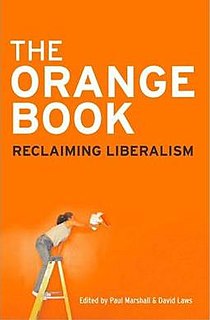 W
WThe Orange Book: Reclaiming Liberalism (ISBN 1-86197-797-2) is a book written by a group of prominent British Liberal Democrat politicians and edited by David Laws and Paul Marshall in 2004. Beside Laws and Marshall, contributors include three future leaders of the Liberal Democrats: Nick Clegg, Vince Cable and Ed Davey. Other contributors include Chris Huhne, Susan Kramer, Mark Oaten and Steve Webb. The book's central philosophy, and some of its ideas, are supported by Liberal Reform, an internal group of the Liberal Democrats.
 W
WPassing on the Right: Conservative Professors in the Progressive University is a book-length study published in 2016 and written by Jon A. Shields and Joshua M. Dunn Sr. The study explored the question of the existence of a liberal or anti-conservative academic bias in the United States via interviews with 153 professors from 84 universities who identify as conservative.
 W
WPioneers of American Freedom: Origin of Liberal and Radical Thought in America is a book by the German anarcho-syndicalist Rudolf Rocker about the history of liberal, libertarian, and anarchist thought in the United States.
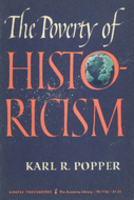 W
WThe Poverty of Historicism is a 1957 book by the philosopher Karl Popper, in which the author argues that the idea of historicism is dangerous and bankrupt.
 W
WThe Rebel is a 1951 book-length essay by Albert Camus, which treats both the metaphysical and the historical development of rebellion and revolution in societies, especially Western Europe.
 W
WThe Revolution: A Manifesto is a New York Times #1 best seller by Republican former U.S. Congressman Ron Paul. The work was published on April 30, 2008 by Grand Central Publishing. According to Paul, the book is based on written notes during his 2008 presidential campaign.
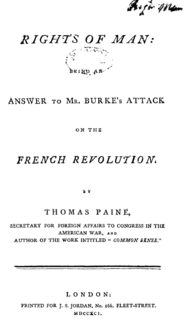 W
WRights of Man (1791), a book by Thomas Paine, including 31 articles, posits that popular political revolution is permissible when a government does not safeguard the natural rights of its people. Using these points as a base it defends the French Revolution against Edmund Burke's attack in Reflections on the Revolution in France (1790).
 W
WThe Road to Serfdom is a book written between 1940 and 1943 by Austrian-British economist and philosopher Friedrich Hayek. Since its publication in 1944, The Road to Serfdom has been an influential and popular exposition of liberalism. It has been translated into more than 20 languages and sold over two million copies. The book was first published in Britain by Routledge in March 1944, during World War II, and was quite popular, leading Hayek to call it "that unobtainable book", also due in part to wartime paper rationing. It was published in the United States by the University of Chicago Press in September 1944 and achieved great popularity. At the arrangement of editor Max Eastman, the American magazine Reader's Digest published an abridged version in April 1945, enabling The Road to Serfdom to reach a wider non-academic audience.
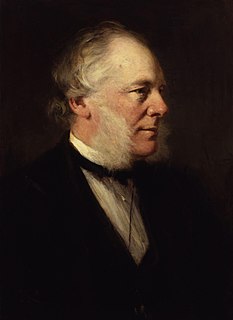 W
WSelf-Help; with Illustrations of Character and Conduct was a book published in 1859 by Samuel Smiles. The second edition of 1866 added Perseverance to the subtitle. It has been called "the bible of mid-Victorian liberalism".
 W
WUnended Quest: An Intellectual Autobiography is a 1976 book by the philosopher Karl Popper.
 W
WWhy Liberalism Failed is a 2018 book by Patrick Deneen, a conservative Catholic professor of political science at the University of Notre Dame. It criticizes both forms of American liberalism – "classical liberalism," typically called "conservative"; and "progressive liberalism," often simply called "liberal."